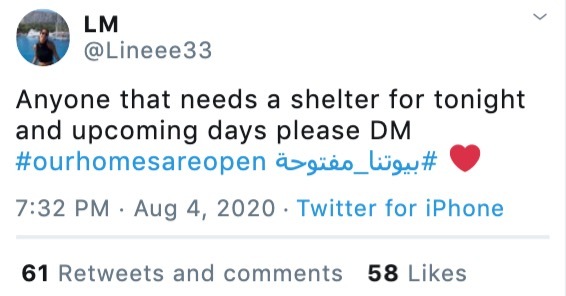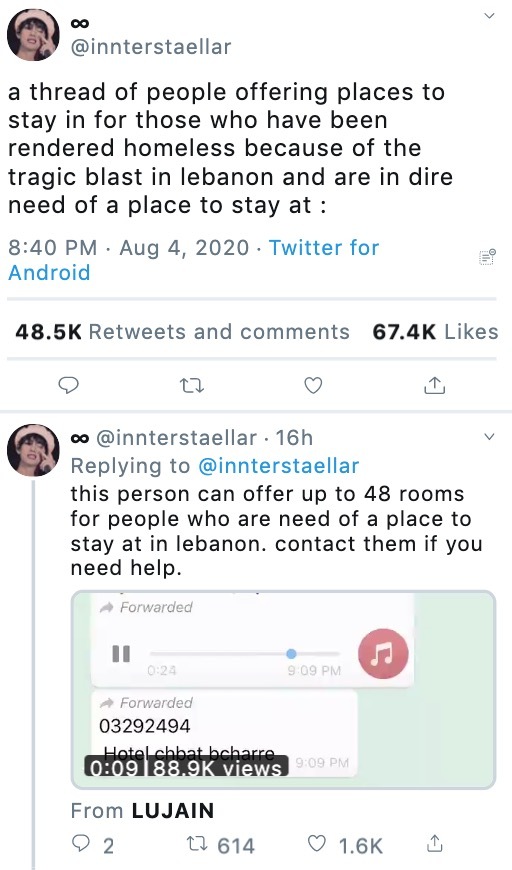Beirut explosion: Homes and hotels offer shelter to victims of the blast

In the devastating aftermath of the shocking Beirut port explosion on Tuesday, thousands of people have been using social media to share details and offer up their homes to those who have been rendered homeless.
A huge explosion in a warehouse in Beirut’s port tore through Lebanon's capital on Tuesday evening, leaving thousands of homes damaged.
An Instagram page called "Open Houses Lebanon" was set up hours after the explosion took place, sharing details of locations and contact numbers for those who have had their homes destroyed by the explosion.
Ammonium nitrate: What is it and how did it get to Beirut's port?
+ Show - HideThere are still many details surrounding the cause of the explosion that devastated much of Beirut on Tuesday that remain murky and unexplained.
However, the Lebanese government has so far indicated that they believe the enormous blast to have been the result of 2,700 tonnes of the chemical compound ammonium nitrate left lying in a warehouse in Beirut port since 2013.
Middle East Eye has compiled a quick guide to the destructive compound and the circumstances surrounding its fateful detonation on Tuesday.
What is ammonium nitrate?
Ammonium nitrate is an industrial chemical commonly used for fertilisers, but also as an explosive, often used in mining.
The chemical, known by the formula NH4NO3, is a naturally white crystalline solid and is often known as saltpetre.
Under most conditions ammonium nitrate is not necessarily dangerous and is relatively stable - it can even be used to smother a fire.
However, if contaminated it can become highly volatile.
What previous incidents have there been?
The most notorious confirmed ammonium nitrate explosion prior to Tuesday was the 1947 Texas City Disaster.
On 16 April 1947, at the Port of Texas City, 2,300 tonnes of ammonium nitrate exploded, killing almost 500 people.
More than 5,000 people were injured and at least 1,000 buildings levelled in the surrounding area.
It was the deadliest industrial accident in US history and resulted in the first-class action lawsuit against the US government on behalf of 8,485 victims.
A more recent incident involving ammonium nitrate took place in 2015 when a series of explosions at a chemical plant in the Chinese port city of Tianjin killed 173 people and injured 798.
Among the blasts at the port was the detonation of 800 tonnes of ammonium nitrate.
Eventually Chinese courts handed jail sentences to 49 government officials and warehouse executives and staff over their involvement in circumventing and loosening safety standards enabling the storage of dangerous chemicals.
How did the chemical end up in the port?
The chemicals originally arrived at Beirut's port on board a Russian-owned cargo vessel flying a Moldovan flag in September 2013.
The shipping monitoring organisation ShipArrested.com at the time reported that "upon inspection of the vessel by Port State Control, the vessel was forbidden from sailing. Most crew except the master and four crew members were repatriated and shortly afterwards the vessel was abandoned by her owners after charterers and cargo concern lost interest in the cargo".
According to documents posted online and seen by Al Jazeera, the ship's dangerous cargo was then offloaded and placed in hangar 12.
Numerous letters were reportedly sent by customs officials, including former director of Lebanese customs Shafik Merhi, to judges between 2014 and 2017 asking for guidance on what to do with the chemicals.
One letter sent in 2016 - which noted there had been "no reply" to previous requests - said the ammonium nitrate was being kept in "unsuitable" conditions.
"In view of the serious danger of keeping these goods in the hangar in unsuitable climatic conditions, we reaffirm our request to please request the marine agency to re-export these goods immediately to preserve the safety of the port and those working in it, or to look into agreeing to sell this amount," said the letter.
Another letter was sent by Lebanese customs administration director general Badri Daher on 27 October 2017 urging a resolution to the situation, in light of "the danger ... of leaving these goods in the place they are, and to those working there".
More than 100 locations have been shared on the page, ranging from people’s homes, studios and bedrooms to schools and churches.
The page also shared information about emergency veterinary clinics open to pets that sustained injuries due to the explosion.
Stay informed with MEE's newsletters
Sign up to get the latest alerts, insights and analysis, starting with Turkey Unpacked
Marwan Abboud, Lebanon’s governor, estimated on Wednesday that around 200,000 to 250,000 people have lost their homes in the incident.
The blast has killed over 100 people and injured more than 4,000, according to the Lebanese Red Cross.
Many people have been left without food, water or shelter, as their main residence suffered severe damage.
Tremors of the explosion were felt far beyond Beirut, with many on social media saying it was heard in Cyprus which lies about 160km away.
The hashtag #OurHomesAreOpen has also been used by people offering their homes for people to stay, as well as transport to move them in or out of the city to safer locations.
A number of hotels that were spared by the explosion have also offered rooms for people.
As hospitals became inundated with patients, people also took to social media to share locations of blood banks in urgent need of donors.
The incident comes as Lebanon struggles with a crippling economic crisis, during which the Lebanese pound has lost 80 percent of its value in less than a year and food prices have doubled. The government had previously warned that 60 percent of the population could be living below the poverty line before the end of the year.
The Lebanese President, Michel Aoun, has called for an emergency cabinet meeting and said that a two-week state of emergency should be declared.
Middle East Eye delivers independent and unrivalled coverage and analysis of the Middle East, North Africa and beyond. To learn more about republishing this content and the associated fees, please fill out this form. More about MEE can be found here.






